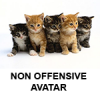Simple C++ Question About Inheritance
If I declare parent object as part of a child object variable list, can I simply assign any child object to the parent object?
Example:
class parentobject
{
public:
some variables;
somefunctions();
}
class childobject1:parentobject
{
public:
parentobject thingie;
etc...
}
class childobject2:parentobject
{
blah blah blah
}
.
.
.
// main code
childobject1 child1;
childobject2 child2;
child1.thingie=child2;
Honest, I''m trying.
You forgot something. When you use inheritance, you have to use either public or protected when deriving a class like this:
class CClass
{
public:
int x;
};
class DClass: public CClass
{
public:
int y;
};
If you code it, they will come...
Commander M
http://commanderm.8m.com
cmndrm@commanderm.8m.com
class CClass
{
public:
int x;
};
class DClass: public CClass
{
public:
int y;
};
If you code it, they will come...
Commander M
http://commanderm.8m.com
cmndrm@commanderm.8m.com
Actually:
child1.thingie = child2;
Won''t work unless you either:
a) make child1.thingie a pointer or a reference.
b) overload operator= to assign a childobject2 to a parentobject.
Mason McCuskey
Spin Studios - home of Quaternion, 2000 GDC Indie Games Fest Finalist!
www.spin-studios.com
child1.thingie = child2;
Won''t work unless you either:
a) make child1.thingie a pointer or a reference.
b) overload operator= to assign a childobject2 to a parentobject.
Mason McCuskey
Spin Studios - home of Quaternion, 2000 GDC Indie Games Fest Finalist!
www.spin-studios.com
Oh yeah, forgot about that ''public, private, friend, protected'' for inheritance.
I kind of thought that simply assigning a object to it''s parent was too simple. It probably will be a pointer in a linked list by the time it is all said and done with.
Thanks a lot, all. It has been a year since I''ve had a go at C++, C worked fine form my <100 line utility coding I was doing. Time break out the cliff notes .
.
I kind of thought that simply assigning a object to it''s parent was too simple. It probably will be a pointer in a linked list by the time it is all said and done with.
Thanks a lot, all. It has been a year since I''ve had a go at C++, C worked fine form my <100 line utility coding I was doing. Time break out the cliff notes
This topic is closed to new replies.
Advertisement
Popular Topics
Advertisement



